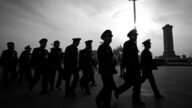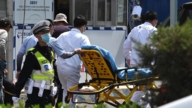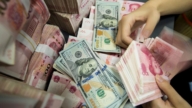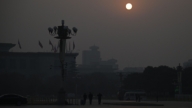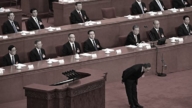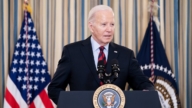【新唐人2014年08月13日訊】據中共官方媒體報導,目前有150多名中國經濟犯罪嫌疑人正在美國逍遙法外,但由於中、美兩國沒有引渡條約,很難將這些人緝捕回國受審。分析指出,中國的人權記錄極差,即便是罪犯,美國也不會貿然將他們押送回中國。
8月11號,中共官方英文報紙《中國日報》,援引中共公安部「國際合作局」局長廖進榮的話指稱,美國已成為中國經濟犯罪嫌疑人逃避法律制裁的首選目地地,目前在美國,約有150多名中國經濟犯罪嫌疑人在逃,其中多數是貪官或貪污嫌疑人。
旅美中國社會問題研究人士張健指出,報導中的150多名中國經濟犯罪嫌疑人,這個數字嚴重縮水。
旅美中國社會問題研究人士張健:「以150名來引述這個,也完全推翻了中共它自己統計的數據,它每年有幾萬名的貪官,有多少萬名的貪官都在裸體做官。在中國,每年潛逃出罪犯,它是有據可查的,他潛逃的國家也是有據可查的,合作局用150名這個數字來形容,其實完全就是想把中國貪污腐敗的問題,讓它縮小,讓它淡化在老百姓心目中的影響。」
據中國「人民銀行」2011年一份報告披露,從20世紀90年代中期到2008年,中國外逃黨政幹部,公安、司法幹部和國家事業單位、國有企業高層管理人員,以及駐外中資機構外逃、失蹤人數達1萬6千到1萬8千人,攜帶款項達8000億元人民幣。
廖進榮表示,由於中、美兩國沒有引渡條約,加上各種程序複雜冗長,要把這些犯罪嫌疑人緝捕回中國受審,面臨很多困難。
報導說,公安部的數據顯示,過去10年,只有兩名經濟犯罪嫌疑人被緝捕回中國受審,其中包括前「中國銀行廣東開平支行」行長余振東。余振東被控涉嫌貪污、挪用公款4億8千2百萬美元,他在逃亡美國兩年半後,於2004年4月被美方驅逐出境,並押送到中國。
公安部「國際合作局」「美洲大洋洲工作處」處長王鋼表示,由於缺乏引渡條約,中、美兩國只能通過每年一次的「中美執法合作聯合聯絡小組」,討論相關重大問題,這顯然不夠。
北京時政觀察人士華頗:「說因為中、美之間沒有引渡條約,所以將那些嫌疑人引渡回來很困難,我想這有幾層意思,第一就是開脫責任,第二,暗指美國和西方是腐敗份子的藏污納垢之地,第三,引渡不利,是多年來中國那些執法機關名聲不佳,一直有嚴重的侵犯人權的問題,所以西方那些民主國家出於人權考慮,對中國一些犯罪嫌疑人引渡回中國,實行了非常嚴格的限制。」
美國紐約律師葉寧對《自由亞洲電臺》指出,中、美兩國都是「國際反酷刑公約」締約國,如果中共不取消酷刑,即使兩國有引渡條約,按照「國際反酷刑公約」第三條,只要被告證明可能受到酷刑,就不能引渡回中國。
旅美中國社會問題研究人士張健認為,中共有意讓中國百姓對美國產生誤解。
張健:「中國現在跟美國的經貿合作、軍事合作,都來往的非常密切,也有高層的熱線電話,這些東西都已經具備的情況下,對於一個罪犯的引渡,把所有難處都歸罪於美國,美國似乎在阻撓,讓老百姓感覺,美方是因為貪圖這些罪犯的錢,或者貪圖這些罪犯給美國帶來巨大的經濟利益,我覺得它抱著很強烈的一個目地。」
據英國《路透社》報導,中共新領導人習近平執政以來,在全國掀起反腐風暴,嚴厲打擊「裸官」。據估算,目前中國約有100萬名裸官。
北京時政觀察人士華頗指出,如果將出逃美國的經濟犯罪嫌疑人緝捕回國受審,可能會引發政壇地震。
華頗:「因為拔出蘿蔔帶出泥,會使這150人背後那些大老虎、相關涉案人員產生極大驚恐,可能會引起政壇一個大震動,產生的影響可能是一個超級核爆!」
據了解,剛被立案審查的中共前政法委書記周永康的兒子周斌持有美國護照,而中共前黨魁江澤民的兒子江綿恆,以及前國家副主席曾慶紅的兒子曾偉,分別持有美國和澳大利亞護照。
採訪/朱智善 編輯/陳潔 後製/陳建銘
China Says Over 150 “Economic Fugitives” Hide in the US
According to China’s official media, over 150 Chinese
“economic fugitives” are hiding in the US.
Because the two countries lack an extradition treaty,
it is difficult to get fugitives home to stand trial.
Analysts say as China has a very bad human rights record,
the US won’t casually hand criminals over to China.
On Aug. 11, China Daily cited Liao Jinrong, director general
of the International Cooperation Bureau (ICB) under
the Ministry of Public Security that
“the US has become the top destination
for Chinese fugitives fleeing the law”.
Over 150 economic fugitives from China, most of whom
are corrupt officials or face allegations of corruption,
remain in the US.
Zhang Jian, US-based China social affairs researcher says that
the number of “150” was much less than the fact.
Zhang Jian: “The number of ‘150’ completely
overthrew its own statistics.
Tens of thousands of corrupt officials and
‘naked officials’ each year flee abroad.
The regime has records and evidence to check and
the countries they have fled to can be traced.
ICB uses the figure of “150” to describe the issue,
in order to minimize the problem of corruption in China,
and to reduce the bad influence on civilians’ minds.”
A report made in 2011 by People’s Bank of China revealed
that from mid-1990s to 2008, 16,000 to 18,000 party officials
fled abroad or disappeared from China.
It includes officials, company executives and overseas staff,
and, an estimated 800 billion yuan ($123 billion)
has been transferred overseas.
Liao Jinrong said that due to the lack of an extradition treaty
as well as the complex and lengthy legal procedures,
it is difficult to get fugitives who
fled to the US back home to face trial.
Public Security figures show that over the past decade,
only two fugitives have been brought home to stand trial.
One was Yu Zhendong, former head of the Bank of China
branch in Kaiping, Guangdong.
Yu was found guilty of corruption and embezzlement
of funds of up to $482 million.
He was deported home by the US in April 2004 after
hiding for two and half years in the US.
Wang Gang, a senior official from the America and Oceanic
affairs division of the ministry’s ICB said that
lacking an extradition treaty, there is only an annual meeting
to discuss major concerns between the two countries,
it is not enough.
Hua Po, Beijing current affairs observer: “Regarding
lack of an extradition treaty it’s difficult to get fugitives home,
I think there are several reasons behind this.
First the regime shirks the responsibility.
Second, the US and the West are havens for corrupt officials.
Third, the failure to get fugitives home is because of
the bad reputation of China over violation of human rights.
Thus the democratic countries consider this point
to limit the hand over of fugitives.
US-based lawyer, Ye Ning told Radio Free Asia, China and
the US are signatories of the UN Convention Against Torture.
If China doesn’t stop torture, even if there is an extradition treaty,
according to the Convention, as long as the defender
can prove he has faced torture, the extradition won’t be applied.
Zhang Jian says that the Chinese Communist Party (CCP)
deliberately misled civilians to misunderstand the US.
Zhang Jian: “China has close economic and
military cooperation with the US.
There are high-level hotlines.
Under these conditions, to extradite a criminal,
and blame the US for causing difficulty, and
let Chinese civilians believe that the US is after these
fugitives’ money and huge economic interests,
I think the CCP has strong purposes.”
UK Reuters reported that since Xi Jinping took office
he launched a national anti-corruption campaign
to strictly fight “naked officials”.
There are estimated to be over 1 million “naked officials”
in China now.
Hua Po says that if the fugitives were extradited home
from the US to face trial, it would cause a political earthquake.
Hua Po: “To pull the carrot bringing out the mud. ‘Big tigers’
behind the 150 fugitives would be very afraid.
It would cause a huge political earthquake.
The impact could be equivalent to a super nuclear bomb!”
Sources say that Zhou Yongkang’s son Zhou Bin
holds a US citizen’s passport.
Jiang Zemin’s son Jiang Mianheng and Zeng Qinghong’s son
Zeng Wei separately have US and Australian passports.
Interview/Zhu Zhishan Edit/ChenJie Post-Production/Chen Jianming



